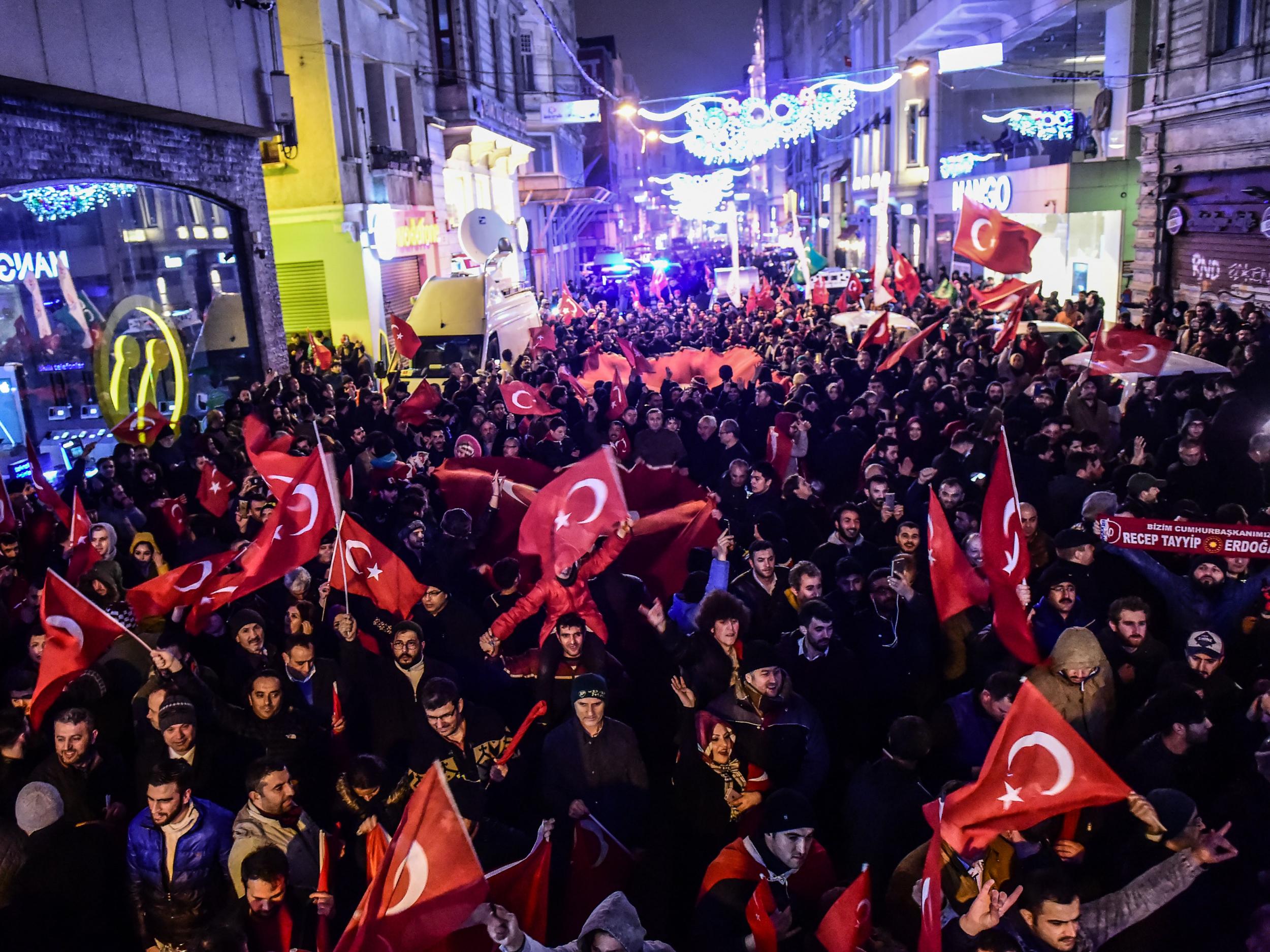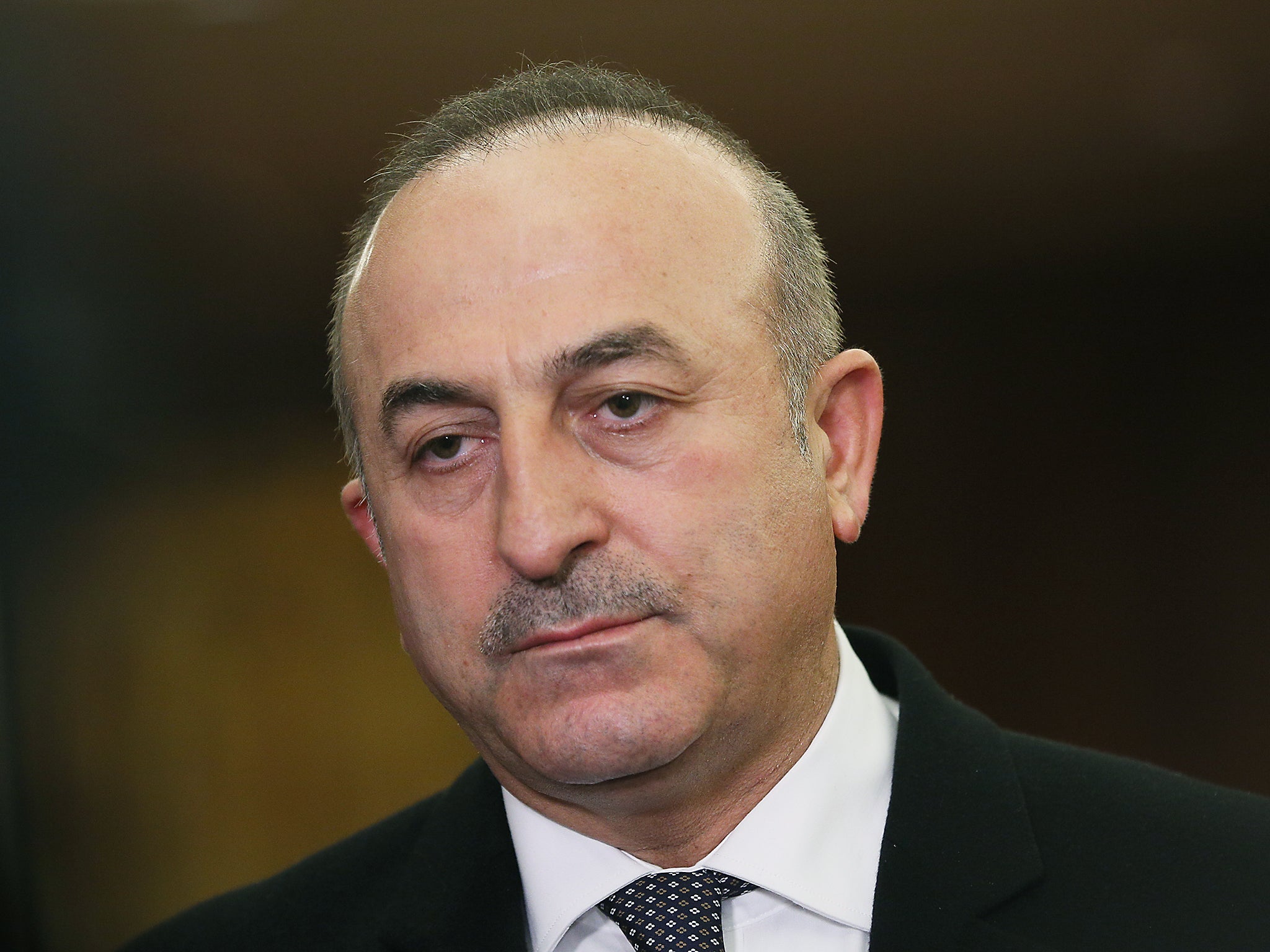Erdogan calls Dutch government ‘Nazis’ after Turkish foreign minister’s plane prevented from landing in Netherlands
Protests at Dutch embassy in Turkey as diplomatic row escalates
Your support helps us to tell the story
From reproductive rights to climate change to Big Tech, The Independent is on the ground when the story is developing. Whether it's investigating the financials of Elon Musk's pro-Trump PAC or producing our latest documentary, 'The A Word', which shines a light on the American women fighting for reproductive rights, we know how important it is to parse out the facts from the messaging.
At such a critical moment in US history, we need reporters on the ground. Your donation allows us to keep sending journalists to speak to both sides of the story.
The Independent is trusted by Americans across the entire political spectrum. And unlike many other quality news outlets, we choose not to lock Americans out of our reporting and analysis with paywalls. We believe quality journalism should be available to everyone, paid for by those who can afford it.
Your support makes all the difference.The Netherlands has withdrawn permission for a plane carrying Turkey’s foreign minister to land in the country ahead of a rally supporting expanded powers for Recep Tayyip Erdogan.
The Turkish President responded by comparing the Dutch government to Nazis while addressing a rally of supporters in Istanbul, just days after using the same label against the German government over cancellations.
“You can stop our foreign minister's plane all you want, let's see how your planes will come to Turkey from now on,” Mr Erdogan told booing crowds.
“They do not know politics or international diplomacy... these Nazi remnants, they are fascists.”

Hundreds of protesters gathered near the Dutch Embassy in the Turkish capital Ankara, despite the street where it is located being sealed off by police.
Demonstrators waved Turkish and Ottoman flags, shouted anti-Dutch slogans and some threw eggs, according to state-run TRT Television.
Authorities also closed off the Dutch consulate, residences of the Dutch ambassador, the head of the embassy and the consul general as tensions between the NATO partners escalated.
Mark Rutte, the Dutch Prime Minister, called the remarks “crazy” at a campaign event. “I understand they're angry, but this of course was way out of line,” he added.
A spokesperson for the Dutch government said the move was taken because of “risks to public order and security” caused by the proposed visit by Mevlut Cavusoglu to Rotterdam on Saturday.
A statement added that while the Netherlands and Turkey could search for “an acceptable solution”, Ankara was not respecting the rules relating to public gatherings.
“Many Dutch people with a Turkish background are authorised to vote in the referendum over the Turkish constitution,” it said.
“The Dutch government does not have any opposition to gatherings in our country to inform them about it. But these gatherings are not allowed to contribute to tensions in our society and everyone who wants to hold a gathering is obliged to follow instructions of those in authority, so that public order and safety can be guaranteed.”

Mr Cavusoglu said he had arrived in Metz in eastern France for a political rally on Saturday evening, tweeting that he was there to "to have a meeting with our Consuls General and to gather with our citizens".
French officials said a rally by Cavusoglu planned for Sunday with the local Turkish population has been authorised and will be allowed to take place unless it represents a threat to public order.
The Dutch government said discussions had been held over whether a smaller meeting could be held in a Turkish consulate or embassy, but that its suggestions had been met with threats of sanctions.
“This makes the search for a reasonable solution impossible,” a spokesperson added.
“Therefore the Netherlands has decided to withdraw landing rights. The Netherlands regrets the course of events and remains committed to dialogue with Turkey.”
Mr Cavusoglu said the decision was “a scandal in every way and cannot be accepted”.
Speaking at Istanbul's airport, he said the Dutch are trying to prevent Turkish officials from meeting voters in Europe, adding: “So they cancelled it due to security concerns, what, so is the minister a terrorist? We will give them the response they deserve.”
He had already been barred from addressing a Turkish rally on the upcoming constitutional referendum by local authorities Rotterdam, but vowed to visit the city regardless.
It was the latest of a series of prohibitions on campaigning in Europe by Turkish leaders drumming up support among the country’s expat voters, including several in Germany.
Turkey summoned the Dutch charge d'affaires to the foreign ministry in Ankara as the dispute continued on Saturday. It came just days before the Netherlands goes to the polls in parliamentary elections on 15 March.
Anti-Islam politician Geert Wilders has attempted to capitalise on the controversy with Turkey, leading a small protest outside the country's embassy and calling Mr Erdogan a “dictator”.
“Leave us alone, lobby in your own country, and stay away,” he said ahead of Mr Cavusoglu's planned rally. “We would not allow lobbying for North Korea or Saudi Arabia in our country either,” he added, calling for the entire Turkish cabinet to be declared “persona non grata”.
With tensions growing between the EU and Turkey, Mr Cavusoglu repeated threats to cancel agreements including last year’s deal to stem the flow of refugees to Greece if the bloc failed to implement promised visa liberalisation for Turks.
He said Turkey would present a final text to the bloc on progress of the deal “and either it will all be cancelled, including the visa liberalisation and migrant deal, or it will all be implemented”.
At least four German local authorities have withdrawn permission for pro-Erdogan campaign events, as well as areas of Austria and Switzerland. Allies of the Turkish President are targeting more than a million Turkish voters living in Europe who will be eligible to cast a ballot in the vote on 16 April.
The referendum could see Turkey’s parliamentary system replaced with an executive presidency using constitutional amendments that have alarmed human rights groups.
Germany’s refusals have sparked a diplomatic row seeing Angela Merkel’s government repeatedly compared to Nazis by Mr Erdogan and his ministers.
All cancellations have cited safety and administrative issues but have been linked to concern over a post-coup crackdown seeing thousands of people detained in Turkey, including a Die Welt journalist who was jailed on terror charges after reporting on government corruption.
Turkey's EU minister, Omer Celik, said the decision “will go down in history as a dark spot on the Netherlands’ democracy and diplomacy.”
He wrote on Twitter that it was “not befitting of friendship”, adding: “This decision does not suit our alliance and our friendship that has spanned centuries. If racist Geert Wilders were in power in the Netherlands, he'd make such a decision.”
Turkey's Family Minister Fatma Betul Sayan Kaya was also blocked by Dutch police from entering the Turkish consulate in Rotterdam, NOS News reported.

Join our commenting forum
Join thought-provoking conversations, follow other Independent readers and see their replies
Comments